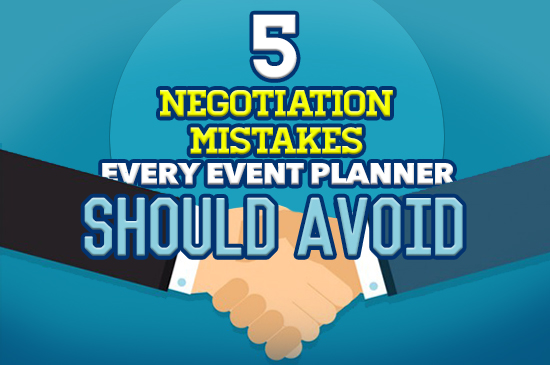Skift Take
Negotiation is a big part of the job when it comes to being an event planner. From negotiating with vendors and venues, to clients and even employers, the negotiation never seems to end. I spoke with three event managers from around the United States and discovered five common mistakes of new event managers, along with ways you can avoid them during your next big negotiation.
1. Lacking Confidence
Negotiations can be intimidating. When you first start out as a planner, these tough conversations might be something you want to avoid. But over time, through practice and experience, you develop the skills and confidence to approach the negotiations in the proper way.
You may be asking for many different items and you don’t always know exactly how the situation will pan out. It can be overwhelming, but nevertheless, you must approach these conversations by using your professional knowledge and skills to come out ahead.
When you begin negotiations, go in with a sense of confidence and prove that your ideas and needs are valid. By showing a sense of knowhow and holding a firm stance, you are much more likely to get what you want. Coming to a mutually beneficial agreement or compromise is always a positive, but be sure to stand your ground during tough negotiations.
2. Not Asking For Enough
It is simply amazing what you can negotiate for. I have used my negotiation skills for everything from professional contracts, to getting an extra-special deal on my gym membership.
Oftentimes, items that may seem off the table or out of reach, can still be acquired by using the power of negotiation. It is good to ask for more than what you want or need, in order to meet in the middle with the other party.
Many planners shy away from this to avoid sounding selfish or needy, but professionals in our industry expect you to come in with strong negotiations. Who knows, you may just get a better deal than you had originally planned for!
These tough conversations can bode very well for your event budget and the only way to find out what you can gain is by asking and negotiating for more. Annie Giangrosso, from Kansas City, who has spent 10 years working in sporting events mentioned that “great negotiation skills can really go a long way in saving you money, gaining these skills early in your career will pay off for many years to come”.
3. Taking Things Personally
Often times the negotiation process can become a bit awkward or challenging, but you should never take it personally. Instead seek to understand the other party’s point of view. If someone is under estimating your skills, try to see things from their perspective and focus on the reasoning behind their behavior or ideas.
Approaching negotiations from a business mindset and not a personal one, will go a long way in your discussions and ultimately your agreements. Many planners see their events as an extension of themselves and, while it is good to show ownership, you want to leave these emotions behind when it comes to negotiations.
4. Losing Your Cool
The easiest way to lose out on a deal or end a negotiation is by getting angry or upset. No one enjoys working with someone who has lost control of their emotions. This behavior will never lead to any type of successful compromise. “You should always maintain respect for the other party and keep your focus on finding a solution.” says Christopher Guy, a Marketing and Event Manager who manages corporate events in Atlanta, Georgia.
Keep your head on straight and maintain a calm and cool demeanor. Nice people are much easier to work with and clients enjoy negotiating with patient and understanding individuals. State your needs and negotiation points in a direct, but professional manner. This will always win out over being pushy and difficult.
5. No Prior Relationship
As much as we talk about removing the personal side from negotiations, developing quality relationships play a major role in how deals are done. People like to work with real, honest, hardworking individuals. The only true way to prove yourself to a client or vendor is by establishing a quality relationship early on.
Stephanie Schwartz, a nonprofit Event Director from Chicago, mentioned you should “always take the time to get to know the vendors and venues you are negotiating with. Learn their needs and see their perspective, so you can use that knowledge to your advantage”.
Do the research, work hard to network in your community and utilize these relationships in a smart way. By putting in the work early on, you will build many connections with vendors, clients or potential employers that you might one day be negotiating with. When that time comes, these individuals will be much more willing to work with you and perhaps bend a little more during the tough conversations.
In Conclusion
Negotiation is a must-have skill for planners on all levels. Oftentimes, simply going for what you want and respecting the other party will lead to success. Whether you’re negotiating a contract, your salary or even your day-to-day expenses, you can learn from the 5 mistakes above. Once you know how to navigate negotiations, the process can become a more enjoyable challenge that you look forward to in your planning process.





